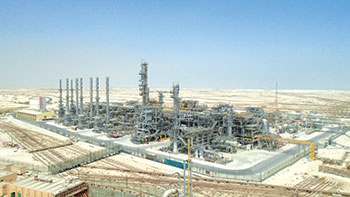
 CGP III plant overall picture
CGP III plant overall picture
Leading EPC contractor JGC is building the $355-million Central Gas Plant 3 as part of an expansion at the Bahrain National Gas Expansion Company to treat 350 million standard cubic feet per day (mmscfd) of unprocessed associated gas (AG)
JGC Corporation, one of the leading engineering, procurement and construction (EPC) contractors in the Middle East with an order book worth billions of dollars, says commissioning is in progress at the Banagas Central Gas Plant Three (CGP-III) with commercial operations set to start soon.
The $355-million Central Gas Plant Three (CGP-III) is being built as part of an expansion at Bahrain National Gas Expansion Company (BNGEC) to treat 350 million standard cubic feet per day (mmscfd) of unprocessed associated gas (AG).
This project involved construction of a plant for recovering high-value-added petroleum constituents (LPG, and naphtha) contained in petroleum-entrained gas which have not been recovered in the past. It is expected that, by exporting recovered petroleum constituents as commercial products, this plant will contribute to the development of the oil and gas industry in Bahrain.
The second part of the expansion involves installation of new field pipelines and expansion of the Sitra storage facility.
JGC Gulf International, a subsidiary of the Japanese major, is responsible for carrying out the $99-million pipelines and storage expansion project, of which pre-commissioning is in progress and commissioning expected in Q4 2018,
This project is spearheaded by BNGEC, which is operated and managed by Bahrain National Gas Company (Banagas).
Bahrain at the moment is at the peak of EPC investment business cycle. With the $4.2 billion Bapco modernisation already awarded, Alba smelter project in progress, Banagas CGP III, Tatweer Gas projects we may see a decline in the contracts in the next 3-5 years. This is not related to the oil price, but the peak capital investment cycle, sources say.
 |
The LPG fractionation area in the plant |
In a 5-10 years perspective new tight oil and deep gas discovery in Bahrain basin is expected to generate some projects with Tatweer and Banagas, they say.
The story is completely different as far as the Saudi market is concerned. The peak investment period has just started and Aramco and other JVs are planning for more capacity addition on gas projects and associated other facilitiesFurther a major boom is expected in the downstream petrochemical business in a 5-15 year period. So Saudi market will remain hot for the foreseeable future.
The scope of the works at CGP III included setting up of an acid gas removal unit, dehydration unit, natural gas liquids (NGL) recovery unit, C3 and C4 treating unit, utility (water, air, nitrogen, hot oil) and offsites.
The units will extract LPG products for exports from associated gas.
For the plant, the residue gas compressor was fabricated by Siemens, Germany, the turbo expander by Cryostar, France and the major static equipment by Wooyang HC, Korea. Wooyang also fabricated the amine absorber/regenerator, de-ethaniser, LPG splitter and de-propaniser.
For the Sitra tank and pipeline project, the storage tanks were made by Felguera IHI, Spain; propane compressors by Mitsui Engg & Shipbuilding Company, Japan; propane and butane pump by Weir Gabbioneta, Italy; instrument air (IA) compressors and dryer units by Gardner Denver, South Korea; 38-m-high warm flare by John Zink Hamworthy Combustion, Italy; fire water pumps by SPP, UK; and fire protection system by Solas Marine Services, Bahrain.
The major civil works of the two projects were undertaken by Mechanical Contracting & Services Company (MCSC) of Bahrain, he says.
The scope of the work for the field pipelines and Sitra storage expansion project included providing EPC services for the storage facilities (comprising LPG storage tanks and chiller unit) and pipelines.
The expansion project provided an additional 100,000-barrel-capacity tank for butane and a 200,000-barrel-capacity tank for propane, and a new Train-Three LPG refrigeration unit.
For the pipelines section, JGC Gulf designed and built a new associated gas(AG)/refinery off-gas (ROG) gathering and pipeline system from the nine existing TP (transportation process) compressor stations to CGP-III. The residue gas stream produced from CGP-III is being piped to the existing headers for re-injection. It then connects the naphtha product outlet from CGP-III to the existing pipeline to Bapco. The work also involved designing and building a new 21-km butane pipeline to the Sitra storage and export facility.
Being a brownfield project, the main challenges associated with the project was ensuring safety and timely coordination. As most of the pipeline construction work was executed outside the plant site, close coordination was required with the client and other parties such as Bapco, Tatweer Petroleum, existing Banagas facilities and the government authorities concerned.
For the project, MCSC executed the general civil, mechanical, electrical and instrumentation works, while Felguera of Spain and Bahrain’s Ramsis fabricated the storage tanks. Bahrain-based Al Hassanain undertook the land reclamation and Al Ahlia Contracting Company, also of Bahrain, built the Electricity Distribution Directorate (EDD) building. For the reclamation works, the bund-type of construction technique was used.
Among contract wins, JGC had won a major lump-sum turnkey contract from Saudi Aramco for the engineering, procurement and construction (EPC) services associated with the Jazan Refinery and Terminal.
Jazan Refinery and Terminal, to be built in the province of Jazan, located in the southeast area of Saudi Arabia, is expected to have 400,000 barrels per day capacity to process crude oils and produce gasoline, ultra-low sulphur diesel and aromatics. JGC is taking charge of the EPC work for the naphtha and aromatics complex.
Given the extremely large scale nature of this mega-project, Saudi Aramco has divided it into 14 separate bidding packages, of which JGC was awarded: naphtha and aromatics complex. JGC was chosen for the project because of its robust history of successful project execution in the Middle East and Saudi Arabia in particular, as well as its superior engineering technology and cost competitiveness, says a spokesman.
The Northern Arabia Unconventional gas (shale gas) project is the first shale gas project executed by JGC Gulf International (the In-kingdom Saudi based subsidiary of JGC corporation.
The project, known as System A, comprises gas processing facilities, well heads and pipelines in Turaif which will feed Waad Al-Shamal phosphate mining project.
Mechanical completion of the facilities is expected soon. Aramco’s 2016 annual report said 55 million standard cubic feet of gas per day (scfd) would be delivered to industrial and power facilities at Waad Al-Shamal by the end of this year.
Early projections estimated the shale gas intake of the Waad Al-Shamal mining complex and power plant being built for Saudi mining firm Ma’aden would be 200 million cubic feet per day by 2018. The complex is expected to hit full capacity by 2019.
JGC’s scope involves the installation of 10 well heads manifold, 10 flowlines (6" with 2.5 km each) and one 50 mmscfd (standard cubic feet per day) processing facilities consisting of KP/LP inlet separators, compressor, TEG unit, gas turbine generator, PIB, chemical tanks, evaporation pond and control rooms.
JGC Corporation has been developing its engineering business in Saudi Arabia for more than 50 years since 1968. In the meantime, the economy in the kingdom has achieved spectacular development and the country is pushing forward to diversify into other industrial areas with the aim of attaining further development.
With a desire to capture more business opportunities through contribution to the kingdom’s further economic development, JGC Corporation decided to set up an EPC Operation Centre in the kingdom and JGC Gulf International Co Ltd was established in 2008.
With over 700 employees, JGC Gulf international is celebrating its 10th year of successful operations and has contributed positively to the economies of Saudi Arabia and Bahrain by executing several oil and gas EPC projects and actively supporting localisation efforts.


















































































